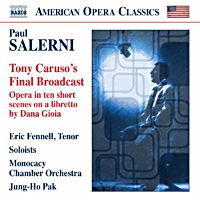
I’ve found myself procrastinating endlessly over this review. I’m always excited by the chance to hear recently composed operas, and have a weak spot for the American repertoire.
So I had overly high hopes for Paul Salerni‘s Tony Caruso’s Final Broadcast. At first listen, I found myself underwhelmed, slightly off put by the blending of genres without a strong commitment in any particular direction.
At repeated listens, however, I found a lot to admire in this delicate score, which is intricately crafted despite some major flaws. Jung-Ho Pak leads the Monocacy Chamber Orchestra in a clear and concise reading. Like many Naxos recordings, the cast is mixed, but overall the voices are strong, the singers young and committed, and the English diction commendable.
Salerni bridges gaps between jazz, opera, and musical theatre, creating music that is decidedly tonal, although never lingering in one genre for very long. This is one of Salerni’s trademarks as a composer, but it makes this work feel a bit unfocused, and it feels hard to digest the piece as whole. The parlando sections come across as the strongest for me, both in the singing and the composition, and where the light orchestration reveals a steady hand. The arias are more mixed, and the singers often fall short.
As Tony Caruso, Eric Fennell veers between extremes. His first aria “I never chose this show” is pitchy and blustery, but his dialogue throughout the opera is clear, the voice youthful and beautiful. The more freely written aria at the end, “Memories of love are midnight’s poison,” shows him in strong form. Throughout the opera he manages to create a convincing portrait of a man looking back at his life. The classical radio station he is working for has been sold, and the new producers will be switching the programming to easy listening and soft rock.
As he presents his final broadcast, he has visions of his mother, Maria Callas, and a mystery woman. Yes, the plot closely resembles A Christmas Carol, as well as the (then unreleased) Prairie Home Companion film. The framework is thin, but is sturdy enough to support librettist Dana Gioia‘s journey through Caruso’s psyche.
The most memorable music goes to the marketing trio (Vicki Doney, Val Hawk and Nancy Reed). Drawing on jazz themes and performed by jazz singers, the similarity to Trouble in Tahiti is striking. As they gleefully break the old classical records, riffing on a few big symphonic melodies, their energy threatens to steal the show. There is something odd to me about giving the villains of the piece the most fun and memorable music, but they offset the morose tone of the piece nicely.
The most interesting moments come from singers with tiny parts. Jacquelyn Familant stands out as the Intern, and Jan Opalach manages to convey a complete character in a few short lines. Their dialogue opens the opera, and sets up the premise, musical tone, and major themes. In another sequence presenting Tony’s childhood, a Nun (Disella Larusdottir) and a priest (Keith Phares) discuss the boy’s future.
Many years later, they chat again about the grown Caruso’s stunted singing career, leading into the hymn “Help us bear this load of sorrow.” The radio station crew eventually join in, and finally the marketing trio. This is the only moment in the opera where various voice styles and genre types seem to blend seamlessly, and we get a sense of human struggle, rather than the isolated regrets of a washed-up singer.
Alison Tupay‘s easy mezzo makes an easy fit for Tony’s doting mother, although she never has enough Italianette in her voice to convince us that she comes from the old country. Her duet with Tony is a clever bridge between the dramatics of Mascagni and the thinner textures of Claude-Michel Schönberg. The scene ends with a fascinating display of temporal illogic, placing Tony’s vision of his mother, the radio program, and the commentary of the marketing trio all into the same moment.
The only really sour note is Phoebe Fennell as Maria Callas. Asking any singer to sing Callas is perverse, and seems destined for failure. Here we get a dictionless mess, and the role veers into parody with an overly darkened voice and an exaggerated attack (she seems to be channeling the opening of Callas” “In questa reggia”). Gioia’s libretto gives us some rather standard lines about the courage needed to be performer, and Salerni’s deconstruction of the bel canto aria never builds to anything substantial.
Patricia Risely does better as The Dark Woman, a combination of “every woman that you”ve ever loved.” Her dark mezzo is particularly lovely in the lower ranges, but the dramatic high notes come out a bit forced. She and Tony sing “Now is the moment,” a lopsided Viennese waltz about the regrets of the past. After she convinces him to give up his past fears and take her as his lover, they close the opera with a fragilely beautiful duet “Only us and only now.” I can”t help but notice the nods to Bernstein and Glass in these final moments, but Salerni creates a depth that is purely his own.
Even at first listen, I could tell that this would make for a fun night at the theatre. Gioia’s libretto is unusually open to staging possibilities, floating through temporal spaces and dreams. The three female visitors have the potential to form a complex psychological narrative – on a CD they are simply three singers. Opera is obviously not solely an aural art form, and this recording exemplifies the emptiness felt by taking away the visual elements, particularly in a modern work. With abundant female soloists and a scaled down orchestra, Tony Caruso’s Final Broadcast seems a natural choice for conservatories and small opera companies. Naxos has done a real service by creating a clean studio recording, although it will be of most interest to singers, directors, and producers. Go see this one in the theater.



























Comments